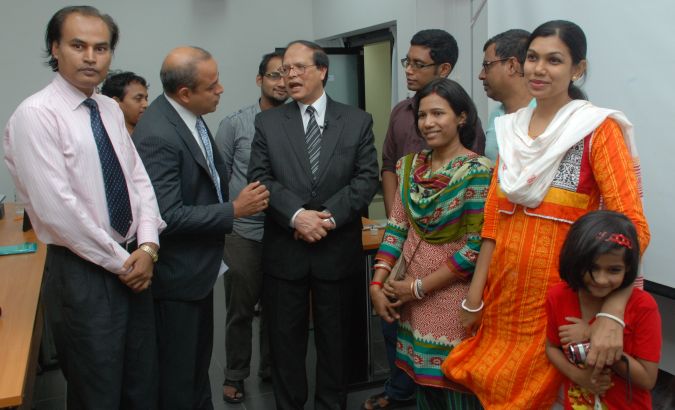The bank governor addressed an audience on 28 March 2014 at the Asian
Institute of Technology (AIT) on "Socially Responsible Financing for
Enhancing Economic and Financial Stability-Glimpses from South Asia.”
The lecture at the AIT School of Management was organized by AIT
Extension through the Professional Master’s in Banking and Finance
(PMBF) program. Dr. Sundar Venkatesh, PMBF Program Coordinator,
organized the special lecture.
Read more about the visit and PMBF
Citing the success story of his native Bangladesh – which has
maintained GDP growth rates of 6% per annum since the global financial
meltdown of 2007-2009 that crippled many world economies – Rahman said
inclusive financing must be a new global priority to ward off the next
round of financial crises.
Dr. Atiur Rahman decried the excessive greed and speculation that
fueled expansion of financial liquidity that was far out of line with
underlying ‘real’ economic fundamentals.
Bangladesh however, was somewhat cushioned, he said, by a prevailing
socially responsible financing mindset that sprang from the 1970s
nongovernmental micro-finance movement and continues today. Rahman also
believes his country’s strong push for inclusive financing and socially
responsible investments buffered the real, everyday economy from the
worst impacts of the crisis.
With life expectancy rates now 3% higher than neighboring India, and
poverty levels decreasing at the same time that foreign investment and
socioeconomic well-being indicators are rising, “Bangladesh is a
well-kept secret of success” he told an audience of international
business students and academics at AIT.
In fact, the Bangladeshi Taka has been the most stable national
currency in the South Asian region during the past five years, Rahman
stated. He added that 35% of Bangladesh’s women possess bank accounts,
as compared to 3% of females in Pakistan.
During his five-year tenure at the helm, “Bangladesh Bank has involved
all banks and financial institutions in a countrywide financing
promotion campaign,” he said, to bring financial services to the
marginalized poor, farmers, unemployed, rural women – and even street
children, who can open accounts with balances of mere pennies.
By reaching out to the nation’s schools, 286, 479 children have opened
bank accounts on his watch, he said, and 13.3 million Bangladeshis have
been brought into banking system for the first time. “No other central
bank in the world would have done this,” he claimed.
At the same time, by opening up mobile financial services to 15
million citizens currently banking via their cell phones, money is fast
flowing out of the capital Dhaka to impoverished rural areas, he said,
rather than the other way around as it was in the past.
The central bank has positioned itself as a champion for socially
responsible banking hinged on extending financial services to all
strata of society and extending green practices and financing.
Extending credit to agricultural, SMEs and green enterprises is the top
priority, as is mainstreaming corporate social responsibility (CSR)
practices into the domestic financial sector, in particular to benefit
children’s education.
“Inclusiveness and ‘greening’ are the two thrusts of socially
responsible financing,” said Rahman, adding that his bank now functions
as a “completely green, digitized, paperless operation.”
Rahman called on academics, policy makers and thought leaders to study
Bangladesh’s example, as a way to bring economic stability to nations,
regions and the world. “Central bankers can work miracles,” he
concluded, but achieving these requires leadership and participation
from all citizens in society.
The event was also covered by the media in Bangladesh:
Daily Sun
Bangladesh Business News


